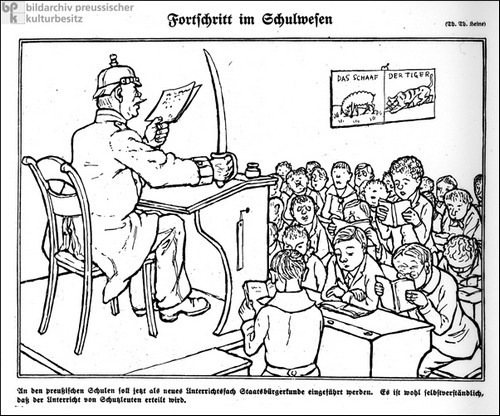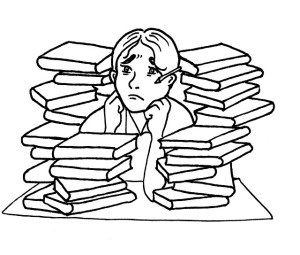by Author Anna Jahns – ICPA.org:
“If our earth is to survive, we need to take responsibility for what we do. Taking control of our education is the first step.” —Heidi Priesnetz
Thomas starts the day just like any other child who sets the pace for his own learning. He wakes up with a grin on his face, eager to greet the day that stretches out before him—relatively unscheduled, yet full of learning opportunities just waiting to be discovered. Before he has even rubbed the sleep from his eyes, he is curiously inspecting the progress of the chemistry experiment he stayed up till late in the night concocting, then wanders into the kitchen to meet his family for a relaxed shared breakfast. They all pitch in to finish the chores around the home and garden they have created together, before Thomas and his mother head down to their local resources library to research the solar panel system the family is constructing, and to prepare for his science study group in the afternoon.
Children like Thomas, who are learning naturally outside of the confines of the traditional schooling system, are an emerging group drawing a great deal of interest from those seeking answers to society’s problems. These young people learn to interact with the whole world as their classroom, their parents and others serving as chosen guides, mentors and facilitators. Research proves that these children grow up to be independent thinkers who perform academically ahead of their schooled peers, and have a solid sense of self esteem. A large percentage of them go on to be self-employed, leading fulfilling lives actively involved in their community. Some choose to attend OTEN (Open Training & Education Network) for their higher education, or enroll in university later in life; others prefer to just get on with following their interests into their chosen careers. The lives they go on to lead are as diverse as the learning paths they have chosen to take them there, but one thing they all have in common is a passion for lifelong learning.
With thought processes unfettered by seeking out only the predetermined “right” answers, and free of the fear of being monitored, judged and tested, self-directed learners are free to explore creative ways of problem-solving and of finding information to answer the questions that are meaningful and relevant to their own lives. Parents of self-led learners discover time and again that children really don’t need to be taught in order to learn; learning is a self-actuated process of creating skills, discovering knowledge and satisfying one’s own natural curiosity. As a way of learning, it is built on—and teaches—the inherent right and responsibility of every individual to set her own standards and to live accordingly. As a way of thinking, it instills and fosters respect for the dignity of each individual.
Education Shapes Our Future
When we imagine the kind of future in which we’d like our children and their children to live, most often we imagine one in which we have finally found ways to further the viability of our biosphere and to live in harmony with each other in a sustainable way. A crucial step for this to happen as a global society is that we must collectively learn to think in new ways, or we will not be able to transcend the interrelated set of problems facing us today. In this age of information, an era of increasing unpredictability and accelerating change, learning how to learn, and how to fluidly adapt and transfer knowledge and skills to novel situations, will become critical. The ability to process and source information is a far more important skill to be honing than rote memorization of outdated facts and theories. More important, perhaps, is the ability to interact with other human beings with an implicit understanding and respect for our diversity, and to co-create sustainable possibilities for our evolving global society.
Our fundamental assumption—that learning is something that can only happen in schools—is “like confusing spirituality with religious institutions, or wellness with hospitals,” says Priesnitz. The fact is that children do not need to be taught in order to learn.
Most sociologists seem to agree that schooling plays a primary role in reinforcing the social and economic tone of a society. So what tone is being set by our schools today? In her book Challenging Assumptions in Education, Wendy Priesnitz illustrates that the system of education our children are being indoctrinated into today is fundamentally the same as it was 100 years ago, when it was designed to prepare factory workers for an industrial culture oriented toward manufacturing consumer goods and winning political and economic wars. Through competition, self-repression, standardization, and strict obedience to the clock, it teaches authoritarianism and unquestioned faith in the experts. It’s a billion-dollar industry in and of itself, which by all accounts is ineffective, outdated, disempowering to the individual, and unable even to produce a fully literate population after years of compulsory schooling.
“Let’s face it,” Priesnitz writes, “the majority of the problems facing society today—pollution, unethical politicians, poverty, unsafe cars…the list goes on—have been created or overseen by the best traditional college graduates. Whether these problems were created by design or accident, we cannot fix them by continuing the status quo. We need to create a society that chooses action over consumption, that favors relating to others over developing new weapons, that encourages conservation over production. And this just won’t happen unless we de-institutionalize learning.”
Challenging the Assumptions
Priesnitz explores the main basic assumptions in education that must be challenged if we are to envision a more sustainable approach to learning and living. Our fundamental assumption— that learning is something that can only happen in schools—is “like confusing spirituality with religious institutions, or wellness with hospitals.” The fact is that children do not need to be taught in order to learn.
Priesnetz goes on to describe how institutionalized schooling shapes young people’s attitudes toward themselves and the world they live in. “From kindergarten, young people are robbed of their basic human rights and treated as legally minor. They are forced to attend an often unfriendly—sometimes threatening— place, where they are obliged to dismiss their own experiences, thoughts and opinions, substituting the opinions of a textbook author. They may learn about human rights in their social science classes, but are not allowed to experience—let alone practice— these vital components of good citizenship.” Their experience is instead one of disempowerment, with teachers allowed to exercise a kind of power over their students that we only see matched in jails.
Schools then measure a student’s ability to regurgitate a prefabricated curriculum on an increasingly standardized scale, with no consideration given to the individual’s aptitudes or developmental readiness. At the end of the school assembly line, with a large part of their lives already spent being processed for a life as producers and consumers, students with little authentic knowledge are bumped out into the adult world and suddenly expected to make mature decisions based on the distorted, disassociated information they have been drilled and indoctrinated with, largely from textbooks and TV. Through this very process, we lose the power to think for ourselves. “Maybe that’s why so few of us challenge the premises of nursing homes, television, day-care centers, schools and the global economy,” suggests Priesnitz. “These things are received ideas, not the result of individuals thinking about what would make their own lives—and those of their families and communities—better on a day-to-day basis.” The solution to this crisis of learning is to put learning back into the hands of the learner—and to put the learner back into the community where he or she lives.
Priesnitz echoes the voices of countless other education revisionists and deschooling pioneers, from John Holt to Ivan Illich, in proposing that a more relevant public education system should be diverse enough to accommodate learners of all ages, interests, abilities and styles. It would put individuals in charge of their own learning agendas, beginning by identifying interests and providing the means to develop them. Communitybased databases could connect those who want to share their knowledge and skills (with or without university degrees) with those who want to learn. Our communities are already rich with people whose skills, knowledge and talents could be shared.
The same databases could be used to coordinate volunteers and apprenticeships for community services and learning desired skills. Young Canadian entrepreneur Heidi Priesnitz (daughter of Wendy) describes the function of MAX, the Mentor Apprentice Exchange she initiated in 1994. “The apprentice offers hands-on assistance in exchange for the mentor’s skills and wisdom, which is an exciting and inexpensive way to learn. This barter can take place in any field of activity, between two people of any age. It’s a holistic approach that allows for greater integration of business, education and community.”
Libraries are already ready-made learning centers that could expand and prosper. With a few modifications, they could provide the usual services of a library as well as those of a meeting space, office space, music hall, youth center, arts center and free school, all rolled into one. People would continue to come and go at will, whenever they find it necessary, all day long. They would use computers to access information, reference resource publications or simply relax and read. Perhaps they would access points of view not carried by mainstream corporate media. The learning centers could host meetings, classes and guest speakers, or participate in or patronize art shows, craft sales and exhibits.
In fact, every aspect of the community can be involved—as it already is—as a real-life part of the self-learning program: museums, parks, health clubs, shops, banks, businesses, town offices, farms, factories and even the streets and the environment itself. Learning becomes a service to the community as future citizens become locally involved, taking part in all kinds of community activities that are meaningful and relevant to their learning process. In the words of homeschooling advocate and author Beverley Paine, “Self-directed learning builds community from the center out, by nurturing the individual, the family and the community, and thus the world.”
Evolving Movement
Around the world, self-directed learning movements are spontaneously self-organizing with exciting innovations in the possibilities for creating learning communities. The Coalition for Self-Learning is an ad hoc group of writers, innovative educators, homeschoolers, autodidacts and educational pioneers with a common interest in the future of learning. The coalition is giving voice to the enormous potential of these experimental models, through its book, Creating Learning Communities (available free online at the coalition’s website, creatinglearningcommunities.org).
In the beginning, only a couple of decades ago, self-directed learners were homeschooled in autonomous family units, each one setting its own curriculum and providing its own supplies and services. Homeschooling alone evolved into homeschoolers getting together to exchange information and provide support to one another through informal get-togethers or organized activities. These meetings give kids a chance to meet other homeschoolers, and to join into study projects together. Groups started newsletters publicizing activities and exchanging books, equipment and other materials; home-based curriculums and materials began being developed, along with organizations to help homeschoolers with legal and legislative matters.
Closely associated with the homeschooling movement are a broad variety of alternative schools that are moving in the direction of child-centered education. From the original Montessori and Steiner schools to free schools like those based on the Summerhill and Sudbury models, the explorations and experiments with alternative forms of education have taken as many diverse turns as the people who have forged them. Some innovative educators have demonstrated that when we shed conventional assumptions, schools can become dynamic, exciting places of learning that are responsive to students, families and communities. Some have explored different ways of implementing school-based community learning centers. Still others have explored learning in other community settings, such as the emerging virtual world of the Internet.
Learning Centers
An exciting new phase of homeschooling and self-learning has started to emerge in the U.S. and the U.K. in the last few years, as local homeschooling networks and self-learners have started providing themselves with new forms of support programs. The Coalition for Self-Learning is taking an active interest in developing these models, which are being called “cooperative community lifelong learning centers”—places where learning is respected as an act of self-volition, which is integrated into community activities.
Occasionally the center brings in outside instructors to teach specific classes based on the children’s interests. Elective classes include things like papier-mâché, nutrition, math games, newspaper, paper-making and drawing.
These learning centers are cooperatively organized by the member families. Parents pool their talents, resources and expertise, often providing mentoring as well as classes and workshops, using all aspects of the community for education opportunities. Learning communities as diverse as the Pathfinder Learning Center in Amherst, Massachusetts, for homeschooling teenagers, and the Community School in Camden, Maine, whose “relational education” approach has demonstrated striking results with socially challenged individuals, are presenting sustainable models for viable alternatives to institutionalized schooling.
The North Star School & Homeschool Resource Center outside Seattle is just one model of a democratically governed homeschool resource center. The center provides a place for families to meet, share ideas and study together, with a food buying co-op and babysitting exchange available. Although there is an abundant supply of high-quality games, manipulatives and art supplies, the core belief is that the basics are best covered by the homeschooling parents and their children individually. Occasionally the center brings in outside instructors to teach specific classes based on the children’s interests. Elective classes include things like papier-mâché, nutrition, math games, newspaper, paper-making and drawing. By popular request, the center also offers chemistry, geology, theme unit studies, writers’ workshops, drama and community service projects, which appeal to older students.
Some of the coalition writers believe that community learning centers could replace schools as the primary educational agency in a truly democratic, collaborative, sustainable society. More specifically, many believe that diverse expressions of openended, evolving, community-based education are replacing fixed and hierarchical school systems. CSL spokesperson Ron Miller asserts that authentic communities are able to enhance their own development while at the same time enhancing that of each individual in the community, thereby promoting both freedom of personal choice and a sense of responsibility for the whole.
Article originally posted at ICPA.org.













